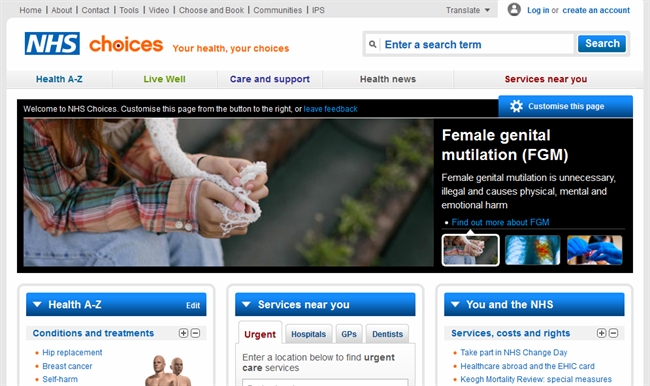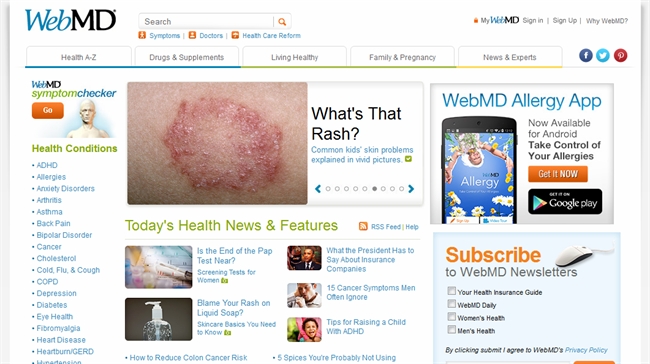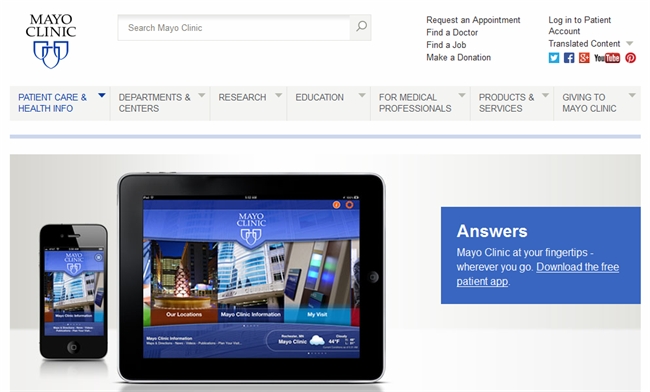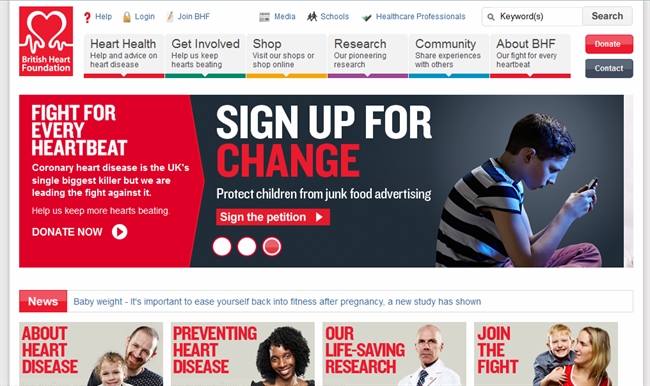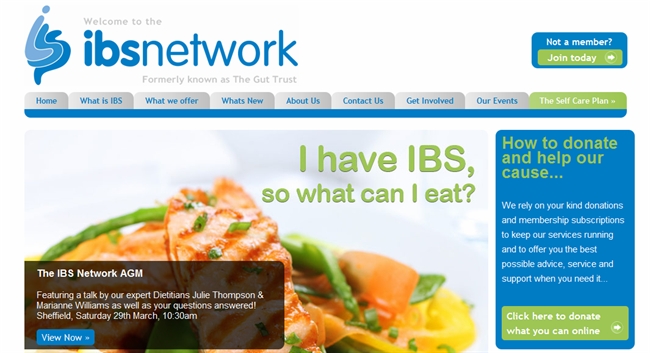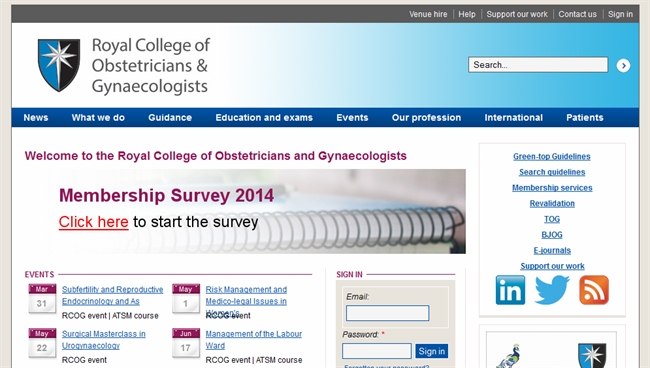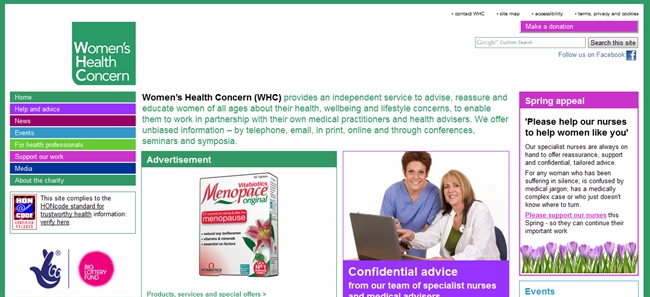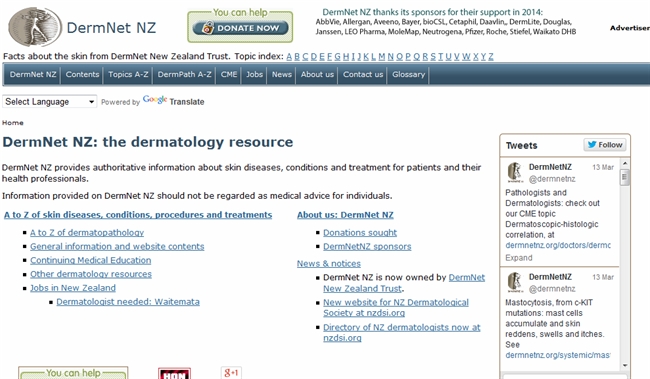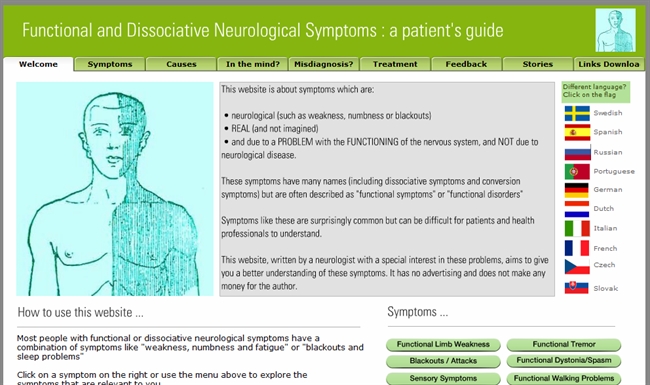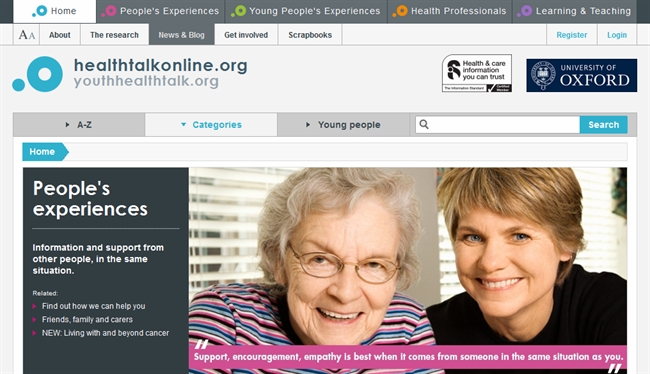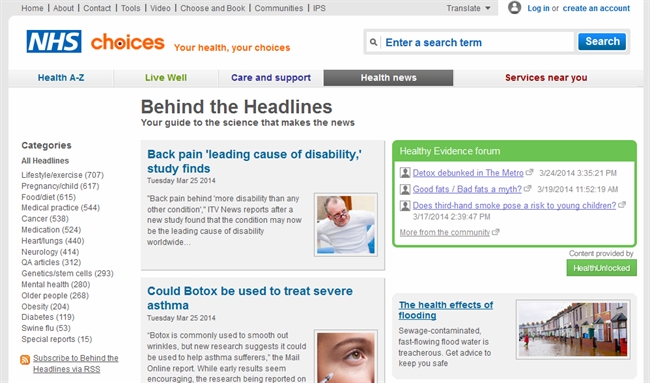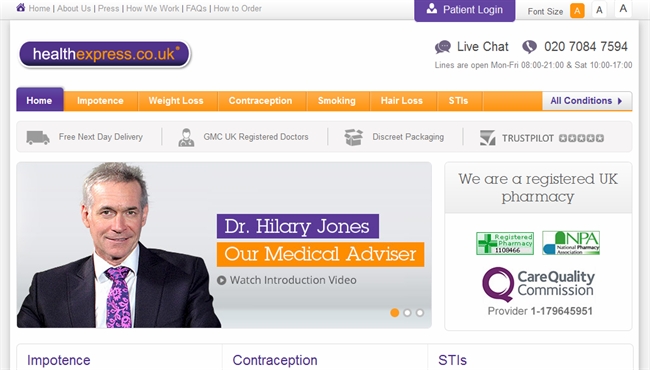A fifth of Brits turn to Google for a diagnosis more than their doctors, according to a report from The Medical Accident group in March this year. But how can you tell if the information you’re connected to is reliable and factual? After much deliberation with medics and consultant specialists, Anna Magee has handpicked Dr Google’s finest
GENERAL HEALTH
Contains up to date and reliable information on a vast range of conditions that can be searched alphabetically and a useful ‘Find a GP’ service. It’s also particularly good for heart disease information, which is still the biggest killer of men and women in the UK.
What it’s best for:
Advice for prevention. It’s useful for all conditions but particularly again for heart disease, for clear and detailed information on alcohol for example where it spells out what a unit is, the kinds of exercise and diet pointers for prevention or if you already have a heart condition. It also lists the right kinds of tests for blood pressure, cholesterol and diabetes you need.
Although its basis is American where it’s produced, it offers the full range of treatments available for conditions that’s technical and scientific but also readable. You can log onto the UK version at webmd.boots.com and this is overseen by UK doctors and lists treatment options available on the NHS – it’s sponsored by Boots but the information is independently produced and reviewed by a medical team. It doesn’t entertain any pet health theories that have no evidence to back them up which is why doctors rate it.
What it’s best for:
The facts. WebMD is like a medical student textbook explained to a non-medical audience. That means it’s great for lists of symptoms and treatments options for just about every condition you could think of. It also reports on health news with a balanced approach, referencing where studies appeared and seeking different opinions on them. Likewise, it takes a practical approach to health issues, for example by suggesting questions to ask your doctor on certain common conditions such as cholesterol or diabetes.
It’s always bang up to date with all the latest treatment information for patients and if you want it – and some patients want more detail than others – it lists all the references used in each story so you’re reassured the information is not only current but scientifically valid. It’s American, but most health information translates well to the UK patient. To check what treatments are available on the NHS cross-reference with a site such as patient.co.uk or webmd.boots.com.
What it’s best for:
The wide range of treatments from medical to lifestyle. It doesn’t skimp on explaining medical conditions and procedures often using animations and videos to explain tougher concepts for example, LASIK eye surgery. But it also provides useful lifestyle information for mind and body from how to adopt a well rounded fitness routine to recognizing Empty Nest Syndrome in yourself and what to do about it. It also has a great Symptoms Checker in which you pick your key symptom for example, wheezing, and then you are asked to check your secondary symptoms. It goes on to point out possible causes and associated factors to look for to help you get an idea of what it might be. It’s not a replacement for your doctor by any means but it is comprehensive.
HEART HEALTH
Centred around the heart disease patient and their families, it provides services to help them understand their conditions as well as help with fund-raising and a community where people can connect and swap with others that are going through similar situations. There’s also good stuff on prevention on there (it’s still the biggest killer of women in the UK by far).
What it’s best for:
Explaining heart conditions. Heart disease comes in many different forms and these can be confusing. Whether you have an abnormal heart rhythm, angina, atrial fibrillation or heart failure, the BHF website is great for explaining them in layman’s terms without compromising on the medical details you need to know. They make a series of downloadable booklets on conditions that are also given out in clinics. Furthermore, they also clearly explain tests and procedures from a pacemaker, to surgery or an angiogram.
IRRITABLE BOWEL SYNDROME
IBS affects one in ten people and even if they don’t have it many people have symptoms and wonder if they do. It gives a user-friendly approach to the factors to look for in yourself that can help your doctor diagnose it as many medics don’t always spot it (or have much idea about its treatment).
What it’s best for:
Tracking symptoms. It provides useful symptoms diaries that require you to list symptoms symptoms in objective ways that can not only help identify the sorts of lifestyle issues, foods or practices that might cause your symptoms to flare up but also provide an objective tool to show your doctor. It also explains typical reactions to treatment options, plus which particular types of IBS symptoms – there are many – respond best to which treatments.
GYNAECOLOGICAL ISSUES
The Royal College of Obstetricians and Gynacologists’ website for patients
All the information is written by gynaecologists and then reviewed by the RCOG’s Women’s Network, a team of women who proof read it to ensure it’s user-friendly and makes sense to ordinary women.
What it’s best for:
How to recover from surgery and gynaecological conditions. Not only does the site provide the medical evidence for treatments for conditions such as endometriosis, polycystic ovarian syndrome and prolapse it was created to provide information on the conditions and to help them to recover well from them. It can be a difficult to navigate though. If you want comprehensive information leaflets and booklets for recovering well from a procedure, you may need to search for it in the search bar after which your many information options will come up.
The Menopause Society’s information site
Although it provides independent information on all aspects of women’s health conditions, it’s particularly good for providing a wide breadth of information and options about menopause, its symptoms and the variety of medical and alternative therapies that may help.
What it’s best for:
Independent and unbiased information. It’s overseen by a medical advisory panel of highly respected specialist doctors and nurses who work everyday in the women’s health arena and it offers in-depth fact sheets that give the whole story on confusing issues such as the health risks of HRT. It also has an email or phone advice service where, for a £10 donation, you can receive unbiased advice and have your own questions answered on anything related to gynaecological, reproductive or sexual health.
SKIN HEALTH
The New Zealand Dermatological Society
It probably seems odd to recommend a site from New Zealand but this one is incredible (and skin is skin, right?). The information is clearly laid out and accurate plus most treatments they mention are available in the UK making it relevant to a UK audience and more comprehensive than anything of its kind in Britain (any british derms reading this, could be an opening for you?).
What it’s best for:
Seeing what a skin condition looks like. The images it includes of dermatological conditions can be upsetting. Conversely, it means you get an image of a condition and can compare it to what is happening to you.
BRAIN HEALTH
About a third of people that neurologists see have physical symptoms as a result of psychological problems and this explains why you get physical symptoms when what you may have is a psychological condition. It’s written by John Stone, a highly respected neurologist in Edinburgh and comes with real medical authority – it’s been translated to nine languages and is used by neurologists all over the world.
What it’s best for:
Clearly explaining psychosomatic symptoms, that is, those physical symptoms that may look like a severe neurological disorder but are psychological. This can be anything from blackouts and tremors to tingling down one side but could also be someone who may think they have epileptic fits. What they’re having may look like epileptic fits but they are in fact physical manifestations of psychological distress called various things such as ‘non-epileptic attacks’ or ‘dissociative convulsions’. This site makes the distinction clear and easy to understand. Plus, you can better understand what’s happening to you not only by reading about the condition but also hearing the other people’s experiences featured on the site.
High quality, up-to-date and well maintained this site is a brilliant resource about a relatively common condition (one person in 500 has it) and contains a wealth of medical information that is reliable.
What it’s best for:
Information for anyone who has just been diagnosed with Parkinson’s Disease along with clear guidelines and emotional help for carers. One of their mottos is ‘No one should have to face Parkinson’s alone’ and the support that you can access through the site is one of its key strengths. There is also an online community with forums and question and answer sessions in which doctors answer queries on topics such as sleep problems and pain management for people with Parkinson’s.
OTHER USEFUL SITES
An unusual site that gives you the facts about a vast range of conditions but also video interviews with people who have suffered with everything from chronic pain to cancer and each condition has links to websites and organisations that can help. It’s founded by Dr Ann McPherson who had breast cancer and couldn’t find the resources and real stories she wanted online.
Health scares happen and this part of the NHS site is run by medically qualified writers who explore the science behind the stories making news. They look closely at the studies and research that led to them and help allay fears. For example, in one scare the headline shouted: Food Poisoning Warning Over Fruit and Veg on a popular newspaper website. The site explained the study in question referred to fruits and vegetables that were stored incorrectly (not the poor fruit and veg themselves) as having a higher risk of germs such as e.coli and provided useful links to how-to stories explaining good food hygiene. Really useful for hypochondriacs like me.
Created by two GPs and endorsed by the British Medical Association, this is a one stop shop for comprehensive medical information. For example, if you want to know the exact side effects of the medication you’ve just been prescribed, this site leaves no stone unturned. It’s also great for finding a support group of people with a particular condition and has a useful forum where you can chat and exchange stories with people going through a vast range of health conditions and post questions, tips and experiences.
Some people are going to be too embarrassed or busy or lazy to see their GP and while online consultations are not ideal, if you’re going to have them, make sure it’s with a fully legal and accredited British website. At Healthexpress.co.uk you can fill in your medical information an symptoms and be diagnosed online with such issues as sexually transmitted infections and erectile dysfunction that you may feel uncomfortable seeing your doctor about. Then you receive a diagnosis and if needed, a prescription that can be dispensed from a registered pharmacy for the next working day. Use it sparingly though as it can feel impersonal and it is pricey. You don’t pay for the consultation but the cost for medicine is private – to give you an idea of medicine cost, three months supply of the contraceptive Pill, Dianette would cost £30-35.
And of course (shameless plug alert) healthista.com
Why? Because although we cover workouts, body, and diets which might sound like like flimsy topics we take the reporting of them very seriously and fact check everything. We also pride ourselves on the real women’s stories and health journeys we include in our features and blogs and our honesty in reviews about products and treatments. Crucially, when we’re reporting a medical feature, we speak to the most respected experts we can find in the field (and make them get practical as well as informative) and seek peer-reviewed evidence that has been published in medical journals to ensure you reliable, useful information that applies to your life.
Like this article? Sign up to our newsletter to get more articles like this delivered straight to your inbox.



